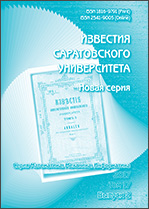|
Scientific Part
Computer Sciences
Learning neural network controllers for stabilizing hybrid dynamic systems
D. K. Andreichenko, F. M. Zhadaev
Saratov State University, 83, Astrakhanskaya
Str., Saratov, 410012, Russia
Abstract:
Control modules based on artificial neural networks (NN) are often used for controlling objects with lumped parameters. Controled objects in such systems have finite set of natural oscillation frequencies. Thereby applying NN-based controllers after setting appropriate internal parameters (learning) minimize or fully exclude probability of appearing unstable natural oscillation frequencies for a long period of time. On the other hand if the controlled object includes objects with distributed parameters (such as elastic rods) the number of its natural oscillation frequencies is at least countable infinite. Thus, for using NN-based controlers for such systems additional check of stability is needed. In case of using classic controllers (such as PID-controller) stability is guarantied by choosing internal parameters of controller from the area of stability of the system. Such approach is not applyable for NN-based controllers since their parameters are determed during the learning process. This article develops the rule which guaranties that after the learning process set of NN weights will belong to the area of stability of the system. That rule in fact appears as modification of loss function and does not apply valuable limitations on choosing a learning method. The obtained results could be used in cases of controlling hybrid dynamic systems with help of control modules based on feedforward neural networks.
Key words:
dynamic systems, hybrid dynamic systems, neural networks, control.
Citation:
D. K. Andreichenko, F. M. Zhadaev, “Learning neural network controllers for stabilizing hybrid dynamic systems”, Izv. Saratov Univ. Math. Mech. Inform., 18:3 (2018), 354–360
Linking options:
https://www.mathnet.ru/eng/isu770 https://www.mathnet.ru/eng/isu/v18/i3/p354
|

|




 Contact us:
Contact us: Terms of Use
Terms of Use
 Registration to the website
Registration to the website Logotypes
Logotypes








 Citation in format
Citation in format 